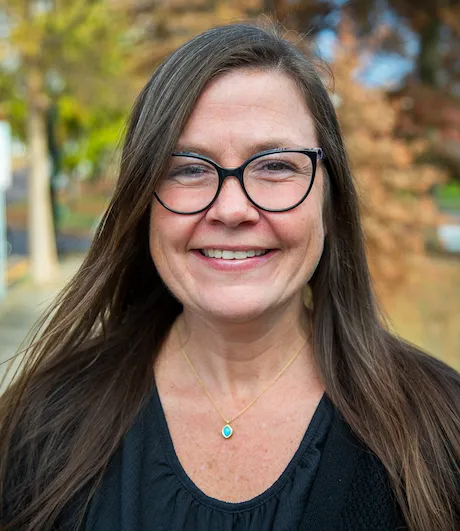
- Biochemistry I
- Biochemistry Lab I
- Chemistry Capstone I
- Biochemistry II
- Biochemistry Lab II
Dr. Kimberly Suzanne George Parsons, who completed her doctoral work at Ohio University in 2011, was awarded the John G. and Jeanne McCoy Teaching Excellence Professorship, the highest teaching honor at Marietta College, in 2016, and she became a tenured faculty member the same year. She received the Edward G. Harness Outstanding Educator Award, honoring her high level of commitment to the education of students in and outside of the classroom in 2014, and has also earned the First Year Student Advising Award (2014) and Advising in the Major Award (2017). Dr. Parsons was recently awarded the Gilde-Grose Distinguished Professor in the Sciences (2023), which honors her outstanding scholarly activity for the purpose of inspiring students.
Dr. Parsons teaches in the Department of Chemistry and Biochemistry, and her regular teaching duties include Biochemistry lecture and laboratory courses (CHEM 420-426). She also teaches general chemistry and capstone courses. Dr. Parsons presents her research nationally every single year at the American Chemical Society meeting with her junior and senior research students. The Parsons Research Lab studies paraben-induced apoptotic cell death signaling pathways in mammalian cells. Current studies are focused on the effects of methyl-, heptyl- and mononitroparaben on apoptotic caspase-activated apoptosis in human melanoma cells, including elucidation of involvement of the mitochondria and membrane lipid rafts in the cell death pathways. Dr. Parsons collaborates with Dr. K. Pate’s laboratory, which synthesizes and characterizes the paraben derivatives used in these studies.
Dr. Parsons is also the Director of the Investigative Studies Program – Marietta College’s program of undergraduate research. She is passionate about promoting undergraduate research and creative projects across the entire campus – the program provides funding for students to perform research during the summer or academic year, to travel to present their research at academic conferences, or to purchase project supplies. Dr. Parsons also organizes and executes All Scholars Day every spring. All Scholar Day is an important campus-wide celebration of undergraduate research and creative projects during which students give talks, poster presentations, demonstrations, and performances for audiences across disciplines, demonstrating the importance of the liberal arts at Marietta College.
Suzanne and her husband, Dr. Eric Parsons, have two daughters, Lily and Emmy. They live in Marietta, and their family loves to garden, travel, hike, swim, and camp. Suzanne loves baking and cooking, spending time outside, and being with her family.
Wood, R.S., Greenstein, R.S., Hildebrandt, I. and Parsons, K.S.G. 2018. The apoptotic effect of methylparaben and ultraviolet light on M624 melanoma cells.
InTech (Medicinal Chemistry), DOI: 10.5772/intechopen.78575
Nisar, M.F., Parsons, K.S.G., Bian, C.X. and Zhong, J.L. 2015. UVA Irradiation Induced Heme Oxygenase-1: A Novel Phototherapy for Morphea. Photochemistry and Photobiology, 91(1): 210-20.
George, K.S. and Wu, S. 2012. Lipid raft: a floating island of death or survival. Toxicology and Applied Pharmacology, 259: 311-319.
George, K.S., Elassaki, W., Wu, Q., Wu, S. 2012. The role of cholesterol in UV light B-induced apoptosis. Photochemistry and Photobiology, 88(5): 1191-97.
George, K.S., Wu, Q., Wu, S. 2010. Effects of freezing and protein crosslinker on isolating membrane raft-associated proteins. Biotechniques, 49: 837-838.
Laszlo, C.F., Fayad, S., Carpenter, O.L., George, K.S., Lu, W., Saad, A.A., Wu, S. 2009. The role of translational regulation in ultraviolet C light induced cyclogenase-2 expression. Life Sci, 85: 70-76.
Parker, S.H., Parker, T.A., George, K.S. and Wu, S. 2006. The roles of translation initiation regulation in ultraviolet light-induced apoptosis. Mol Cell Biochem, 293: 173-181.